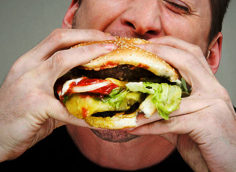- The leaner you are, the more often you can cheat. But don't force it. Calling the binge session a "cheat meal" and using it as an excuse to eat a bunch of junk food is not the way to get big and muscular.
- Cheat meals should only be planned when you're trying to gain mass. During this time, cheat meals eaten once per week, or once every two weeks are fine, depending on your goals or your body-fat percentage.
- You don't need them if you're regularly eating large amounts of good food. You'll certainly be getting all the good calories you need to grow. And you won't be hungry for crappy food. In fact, one way to assess that you're eating enough good food each week is to ask whether you're craving cheat foods. If so, you need more calories through the week. Scientifically, this makes sense since chronic overfeeding causes the brain to release satiety hormones and these hormone signals tell the brain's hunger centers to "shut up and sit down."
- Minimize cheat meal frequency and/or size when over 15-20% body fat. Basically, the more body fat you have, the more likely that any excess food will be shuttled toward body-fat storage rather than muscle mass. So, if you're fat, minimize cheats.
- Don't have cheat days or meals while you're trying to lose fat. I know, I know, you've always heard talk about "stoking the metabolic fire" or some nonsense like that, but simply put, that's bunk. Psychologically, it's very difficult to stay disciplined after a cheat meal. After weeks of dieting, the taste buds, which have all but given up hope, are stirred back to life. Each time you cheat on the diet, it's more difficult to stay strict the next you're being tested by the devil on your shoulder.
- Physiologically, there's no sound reason to have a cheat meal. One meal will not upregulate your sluggish dieter's metabolism, despite what you've heard. Sure, the metabolic rate gets upregulated for a few short hours after the big meal, but no way will this thermogenesis account for the large caloric load you'll be dumping into the gut at once.
So the final answer is that it's okay for some people to have the cheat meal. Others should avoid it. Know which one you are.





